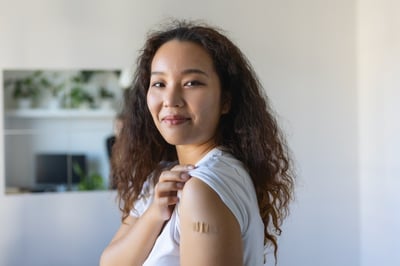Update: Breast cancer vaccine trial begins enrolling people with BRCA1 and PALB2 mutations
Summary
A new vaccine was first tested on people diagnosed with triple-negative breast cancer. The vaccine is now being tested to prevent breast cancer among people with an inherited mutation in BRCA1 or PALB2 who are at high risk and who are planning to have a risk-reducing mastectomy. (Posted 1/9/23) Este artículo está disponible en español.
Printer Friendly Page Read the Original Article
RELEVANCE
Most relevant for: People with a BRCA1 or PALB2 mutation undergoing prophylactic bilateral mastectomy.
It may also be relevant for:
- people with triple negative breast cancer
- people with a genetic mutation linked to cancer risk
Relevance: Medium


Research Timeline: Human Research


What is this update about?
Scientists have been working for years to develop a vaccine that will prevent breast cancer. A small, early-phase study has begun to test whether this new vaccine is safe and effective in humans.
Why is this update important?
Initially, this trial was open only to people with non-metastatic () to see if the vaccine could prevent a recurrence. We published an XRAY review on the press release about the opening of the study. However, the trial has recently expanded to include people who do not have breast cancer but who are at high risk of developing TNBC due to an in or .
This next phase of the study will allow researchers to determine if the vaccine can lower the risk for breast cancer in people who are high risk but have not been diagnosed with the disease.
Breast cancer vaccine trial eligibility
Initially, the trial only included those with TNBC (phase 1a). The trial now has opened to people at high risk of developing TNBC due to an inherited mutation (phase 1b). Both versions of the trial are currently recruiting participants.
- Phase 1a (the TNBC group) is recruiting people diagnosed with TNBC who have:
- 2-3 TNBC.
- completed all standard therapy.
- no evidence of recurrence within 3 years after diagnosis.
- Phase 1b (the prevention group) is recruiting people who:
- are at high risk of developing breast cancer due to an inherited mutation in BRCA1 or PALB2 and are planning to have a prophylactic mastectomy.
- have no evidence of breast cancer.
Phases 1a and 1b will test not only the safety of the vaccine but also its effectiveness in preventing breast cancer. Phase 1a will test whether the vaccine can decrease recurrence in people who have been diagnosed with non-metastatic TNBC. Phase 1b will test how well the vaccine prevents breast cancer in high-risk people (BRCA1 and PALB2 mutation carriers) who have not had the disease.
This trial is being conducted at the Cleveland Clinic in Cleveland, Ohio. More information can be found here. A third arm of the study, which is not yet enrolling participants, will test the vaccine in people with TNBC who are being treated with the checkpoint inhibitor pembrolizumab.
What does the vaccine do?
The vaccine trains the immune system to kill cells that make a substanced called "alpha-lactalbumin," a protein that appears on breast cells late in pregnancy and during breastfeeding. Once a woman is no longer pregnant or breastfeeding the protein is no longer made. However, women who develop breast cancer, particularly TNBC, also produce alpha-lactalbumin on their breast cancer cells.
The development of this vaccine is based on more than 10 years of research. In 2010, researchers published study results showing that the vaccine dramatically decreased breast cancer in mice. Importantly, this study also found that the vaccine did not cause inflammation in normal non-breast tissue. In 2016, tests on lab-grown human breast cancer cells, breast tumor samples and breast tumors in mice showed that the vaccine has the potential to be safe and effective.
Like most phase I trials that test safety, this trial is small. Phase 1a will include up to 30 people with non-metastatic TNBC who are at high risk of recurrence. The number of people who will be enrolled in Phase 1b has not been posted yet on clinicaltrials.gov.